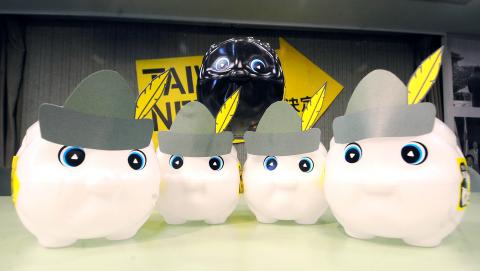The Democratic Progressive Party (DPP) yesterday distributed 20,000 limited-edition white piggy banks in its latest promotion for its “three little pigs” fund-raising effort.
The white piggy banks are decorated with Robin Hood hat stickers, making references to DPP presidential candidate Tsai Ing-wen (蔡英文) as the mythical British outlaw as after a recent Associated Press story described Tsai as a “Robin Hood-like heroine.”
“This is an ‘iPig’ rather than an ‘iPad,’” DPP spokesperson Lin Chun-hsien (林俊憲) said.

Photo: Wang Min-wei, Taipei Times
Like their less nattily attired predecessor piggy banks, the DPP would like the Robin Hood ones returned to DPP campaign headquarters on Dec. 10. Lin estimated that at least 300,000 piggy banks have been distributed nationwide since the beginning of the campaign.
The “piggy banks” campaign stems from an incident last month when the DPP had to return three piggy banks donated by three-year-old triplets after the Control Yuan warned that the donations were in violation of the Act Governing Political Donations (政治獻金管理條例) because the donors were not of voting age.
The law stipulates that only people of voting age and those who meet other eligibility rules are allowed to make political donations.
The incident sparked a craze among Tsai’s supporters for making donations to the party in piggy banks. The party has produced a banks in a variety of colors, including pink in Greater Kaohsiung and black in Taipei.
Additional reporting by staff writer

CAUTION: Based on intelligence from the nation’s security agencies, MOFA has cautioned Taiwanese travelers about heightened safety risks in China-friendly countries The Ministry of Foreign Affairs (MOFA) yesterday urged Taiwanese to be aware of their safety when traveling abroad, especially in countries that are friendly to China. China in June last year issued 22 guidelines that allow its courts to try in absentia and sentence to death so-called “diehard” Taiwanese independence activists, even though Chinese courts have no jurisdiction in Taiwan. Late last month, a senior Chinese official gave closed-door instructions to state security units to implement the guidelines in countries friendly to China, a government memo and a senior Taiwan security official said, based on information gathered by Taiwan’s intelligence agency. The

The National Immigration Agency (NIA) said yesterday that it will revoke the dependent-based residence permit of a Chinese social media influencer who reportedly “openly advocated for [China’s] unification through military force” with Taiwan. The Chinese national, identified by her surname Liu (劉), will have her residence permit revoked in accordance with Article 14 of the “Measures for the permission of family- based residence, long-term residence and settlement of people from the Mainland Area in the Taiwan Area,” the NIA said in a news release. The agency explained it received reports that Liu made “unifying Taiwan through military force” statements on her online

Taiwan Semiconductor Manufacturing Co (TSMC), the world’s largest contract chipmaker, said yesterday that it is looking to hire 8,000 people this year, at a time when the tech giant is expanding production capacity to maintain its lead over competitors. To attract talent, TSMC would launch a large-scale recruitment campaign on campuses across Taiwan, where a newly recruited engineer with a master’s degree could expect to receive an average salary of NT$2.2 million (US$60,912), which is much higher than the 2023 national average of NT$709,000 for those in the same category, according to government statistics. TSMC, which accounted for more than 60 percent

Tung Tzu-hsien (童子賢), a Taiwanese businessman and deputy convener of the nation’s National Climate Change Committee, said yesterday that “electrical power is national power” and nuclear energy is “very important to Taiwan.” Tung made the remarks, suggesting that his views do not align with the country’s current official policy of phasing out nuclear energy, at a forum organized by the Taiwan People’s Party titled “Challenges and Prospects of Taiwan’s AI Industry and Energy Policy.” “Taiwan is currently pursuing industries with high added- value and is developing vigorously, and this all requires electricity,” said the chairman